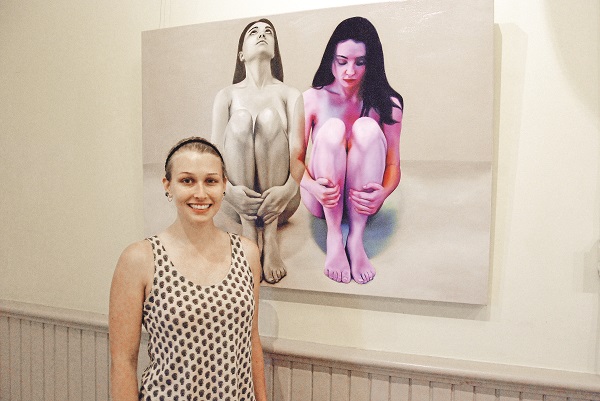Archive
Aurora artist breathes new life into death in “Shift”
July 9, 2014 · 0 Comments

By Brock Weir
As a student preparing to enter her fourth year at OCAD, the life and work of Aurora artist Krista Arnold took an unexpected shift.
Staying with her mother at the hospital as they watched over her grandmother in the final stages of her final illness, her mother turned to her and said, “She is still alive, but I think she is gone.”
For countless people who have sat watching the life ebb out of a loved one, it is a feeling many people can relate to, but it struck a powerful chord with Krista as she pondered just what happens when one is preparing to make that transition, or that “Shift” from life into death.
“Shift” is a new exhibition now on in the Great Hall Gallery at the Aurora Cultural Centre. Now back home in Aurora, it is the first hometown exhibition for Ms. Arnold after numerous shows in Toronto.
On Thursday, Ms. Arnold was working with friends and Cultural Centre staff hanging her portraits so everything was just right. The nudes put into context the very moment when whatever constitutes the person is preparing to leave its bodily form.
“From a very young age I had a fascination with death, the idea of where we go and what it feels like,” she explains. “I remember always asking my mom what it will feel like when I am not here. The idea that it will feel like nothing has always been a really weird concept for me. That has always been something of what makes us human – that border and where does that line cross.
“[Until that moment] I didn’t really understand. It hadn’t occurred to me that this energy that made them is beyond the heart beating and the energy function that once it is gone, there is more of a distinction between life and death than your actual time at the hospital.”
Her grandmother ultimately made the shift on the first day of her fourth year of university and, coincidentally, within the first two weeks of her final year at OCAD she had to come up with a final proposal for her thesis. When push came to shove, her choice of focus was not particularly hard.
“It was all I was thinking about and there was nothing else I could address other than what was going on in my life, but how do I turn my experience into something people can relate to and connect with?”
In the back of her mind were memories of her grandmother’s encouragement. She was always a big champion of her art in life and whenever her grandmother came to visit, often the first words out of her mouth were “Show me your newest painting.”
With that in mind, she set out not just with her camera and paint brush, but also hit the books to find other perspectives on the “shift.” What she found were different concepts of body and soul, more often than not, rooted in religion.
“All the information I was getting was associated with religions and I am a much more spiritual person than a religious person,” says Ms. Arnold.
“I found it interesting this spiritual moment between life and death, even though all the information I was getting about religions relates almost to every religion. I find that more interesting than anything that it is something that unites all religions – no matter what you believe about ‘afterwards’, we still have this moment between where something happens, whether we poof into nothing or there is a shift of energy where something leaves us.
“That is consistent across all life, but people have come up with different explanations.”
As to whether she has come up with any definitive view of her own when it comes to the “shift”, she says it’s hard to say.
“I guess I’ll know when I get there!” she says. “I think there is something distinctive about being human. Call it our soul, our spirit, our personality or consciousness, there is something more than science, more than numbers, and more than just an official time of death on your hospital chart. There is an extra factor in all of this.”
Whatever that extra factor is remains to be seen, but for visitors to “Shift”, Ms. Arnold says she hopes people will connect with the work and see the “temporal” nature of life.
“Maybe they’ll take away that it is not so much something to fear as it is something to change in whatever we are,” she says. “When you talk to people about death, it is always scary and dark. It is not a happy thing to talk about it, but this is just a different light.”











